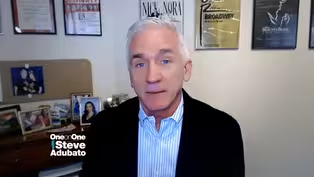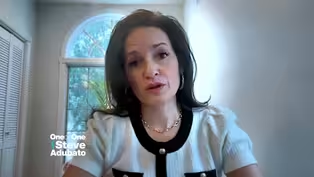One-on-One
Giving Hospice Patients A Dignified End-of-Life Experience
Clip: Season 2024 Episode 2707 | 10m 4sVideo has Closed Captions
Giving Hospice Patients A Dignified End-of-Life Experience
Steve Adubato goes on-location at Villa Marie Claire Residential Hospice with medical director Charles Vialotti, MD to talk about his personal commitment to hospice care and giving residents and their families a dignified end-of-life experience.
Problems playing video? | Closed Captioning Feedback
Problems playing video? | Closed Captioning Feedback
One-on-One is a local public television program presented by NJ PBS
One-on-One
Giving Hospice Patients A Dignified End-of-Life Experience
Clip: Season 2024 Episode 2707 | 10m 4sVideo has Closed Captions
Steve Adubato goes on-location at Villa Marie Claire Residential Hospice with medical director Charles Vialotti, MD to talk about his personal commitment to hospice care and giving residents and their families a dignified end-of-life experience.
Problems playing video? | Closed Captioning Feedback
How to Watch One-on-One
One-on-One is available to stream on pbs.org and the free PBS App, available on iPhone, Apple TV, Android TV, Android smartphones, Amazon Fire TV, Amazon Fire Tablet, Roku, Samsung Smart TV, and Vizio.
Providing Support for PBS.org
Learn Moreabout PBS online sponsorship(upbeat music) I recently had a chance to speak to Dr. Charles Violotti, the resident medical director at Villa Marie Claire, connected to Holy Name Medical Center.
I talked to Dr. Violotti who's spent his entire professional career as a clinician caring for those who are at the end of their life.
That's what Villa Marie Claire is.
It's a place for people to spend those last days of their lives, how they live those days, and Dr. Violotti's commitment to helping family members and patients who are there, live those last few days with dignity is unparalleled.
Dr. Charles Violotti, it's an important conversation about end of life.
- Doctor, we're here at Villa Marie Claire.
You've been connected to this place from when?
- I connected since we first opened in January of 2011, but I've been living here since March of 2012.
- Mm-hmm.
You and I have had so many conversations over the years, in person, remotely.
First time here.
Why is it so important that you do live here?
- Well, I think it creates an entirely different dynamic between the patients, the staff, and the families.
I find that toward the end of the day, when the social visits are coming to a close, when the neighbors and friends are going home from their half hour, hour visits, the families are alone with their loved ones.
They're having dinner in the dining room.
They're walking around outside in the gardens, and they seek me out so that we can talk about their deeper emotions, their deeper reaction to what's going on.
Questions about what I anticipate their loved one to experience, what opportunities or options are available for them or their family members.
Sometimes they do a lot of soul searching and share a lot of history of the patient because they want me to know more of who the person was before they came.
Soul searching about their own relationships with each other, and I find that's very healing.
People then come back for years afterwards just to revisit, to re-talk, to have lunch, to have dinner, to share other thoughts, new relationships.
So I do think it changes the dynamic, having me in the building and available 24/7, basically.
- Doctor, I've asked you this before.
I want to come back to it.
Explain to folks why this has become your life's work.
- I made a commitment.
I've lost a lot of family members, a lot of people who were very close, and unfortunately, Sandy had an undignified and very painful death, despite the fact that she was on hospice in a major New York City hospital.
And my younger sister who died 19 years ago had a terribly painful death.
Again, totally unsupported, despite being in another very large New York City hospital.
And I made a commitment to them that nobody who was entrusted to our care would ever have anything but a dignified, comfortable, respectful end-of-life experience, and no family would ever suffer the trauma that we suffered watching these painful deaths, these undignified deaths.
And then families who were open to it would always be offered support in the bereavement period, none of which were offered to any of us after either of those deaths.
And this was really a commitment I made to people who I lost, who I loved very much, that I would change that legacy, I would change that message, I would change the dynamic, again, just to make life better for unfortunate people who are entrusted to our care.
- Doctor, you know, you understand end-of-life issues from so many perspectives, not just the clinical perspective, but a human, psychological, emotional perspective.
For so many of us who fear, even though we've seen it close up...
Telling Mike earlier that losing my dad and being there at the end was something that I don't actively relive because just the experience is what it is for me.
And my sisters, my mom, we all talk about it.
And so I'm like, "I don't wanna talk about it.
I don't wanna think about it."
But I also know that's not healthy.
I also know that's not... We're not escaping this one.
Translation, what advice do you have for not just me, but more importantly, people watching for whom the idea of death for themselves or those closest to them, the fear is just overwhelming?
Let's not talk about it.
- Yeah.
- You say.
- I understand that, and I think that this is a cultural problem that we have that we don't like to talk about it.
- American culture.
- Anything.
American culture.
- Yes.
- We don't like to talk about anything negative.
We like to focus on positive things, happy things.
- Be positive.
- Yes, and be happy.
And the conversations that lead to discussions of end-of-life care can be very painful and very disturbing if they focus on negativity and abandonment and defeat and hopelessness.
Of course they're painful- - The loss is real.
- But the loss is real.
But if you focus the conversation on support and love and compassion and dignity, if you talk about all the care that you're going to be giving to this person, if you make it clear that by changing your focus, you can actually defocus on the diagnosis that they've been treated for, for years and the treatments that have become toxic and ineffective and futile and isolating and so on, and focus on the wonderful opportunities that are still open to them.
If you just focus on the humanity of the situation, on asking people what they want, where they'd like to be, how they can be supported, what they're worried about about their loved ones.
Most of us don't feel death.
We fear the process.
So we have to assure them- - Whoa, whoa.
Go back again, Charles.
- Yeah.
- Most of us don't fear death.
We fear the process- - The process of dying.
- Of dying.
- Yeah, I think we fear that we'll be in pain or that we'll be a burden to our loved ones or that we'd be in some sort of desperate situation.
If we assure people that those symptoms, those problems can be alleviated with medical and psychological and social support, but more than that, when we're approaching the end of life, we worry about the impact of our death on our loved ones.
We're there to protect them as we've always protected them.
So if they see, if we as a end-of-life person see that their family are already being embraced by the counselors, by the social workers, by the support staff, if they see they're already getting this anticipatory support, we can let go with confidence that they're not gonna be abandoned, that they're not going to fail to stay together as a family unit, but in fact that they're gonna be supported and that they will move forward after we die.
And I also don't believe that we should be telling our loved one, "It's okay to go.
We're fine.
Don't worry about it."
- Don't say that.
- I don't believe that because I don't think anybody, any parent or any child or any sibling or a spouse really believes that their husband or their parent is fine.
I mean, you know, they know it's sad, but I think more important, we love you and we'll miss you, but we promise the legacy that you've created will continue.
I'll keep the family together.
Everything that you've established will go ahead.
People will know of your goodness through us and through our children.
That's the message we want to hear, that our departure isn't going to defeat and destroy everything we've spent our lives creating.
I think that's a believable message, and I think that's a valuable message for people to help them relax and be able to accept the transition.
- Thank you, Charles.
- [Narrator] One-On-One with Steve Adubato has been a production of the Caucus Educational Corporation.
Celebrating 30 years in public broadcasting.
Funding has been provided by The North Ward Center.
Investors Bank.
The Russell Berrie Foundation.
Kean University.
Johnson & Johnson.
PSEG Foundation.
The Fidelco Group.
New Jersey Sharing Network.
And by the Adler Aphasia Center.
Promotional support provided by Insider NJ.
And by The New Jersey Business & Industry Association.
The North Ward Center continues to expand their services and outreach in Newark, from the childhood years to the golden years, Offering programs like preschool, youth leadership development, Casa Israel Adult Medical Day program our Family Success center, as well as a gymnasium.
And most recently Hope House, a permanent home for adults with autism, supporting and nurturing our autism community with Hope House 2 coming soon.
The North Ward Center.
We’re here when you need us.
Paper Mill Playhouse Brings The Great Gatsby to Broadway
Video has Closed Captions
Clip: S2024 Ep2707 | 8m 53s | Paper Mill Playhouse Brings The Great Gatsby to Broadway (8m 53s)
Transforming Urban Education in Newark
Video has Closed Captions
Clip: S2024 Ep2707 | 9m | Transforming Urban Education in Newark (9m)
Providing Support for PBS.org
Learn Moreabout PBS online sponsorship
- News and Public Affairs

Top journalists deliver compelling original analysis of the hour's headlines.

- News and Public Affairs

FRONTLINE is investigative journalism that questions, explains and changes our world.












Support for PBS provided by:
One-on-One is a local public television program presented by NJ PBS

